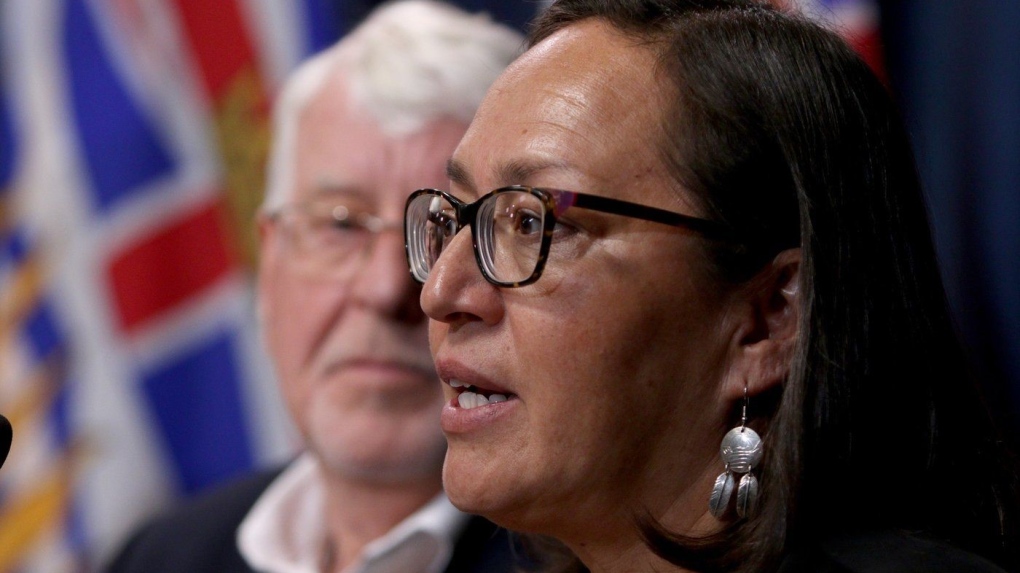First Nations women overrepresented among B.C. toxic drug deaths: doctor
 Dr. Nel Wieman with the First Nations Health Authority speaks about the illicit drug toxicity deaths in the province and about the effect on First Nation's communities during a press conference at B.C. Legislature in Victoria, B.C., on Monday, February 24, 2020. THE CANADIAN PRESS/Chad Hipolito
Dr. Nel Wieman with the First Nations Health Authority speaks about the illicit drug toxicity deaths in the province and about the effect on First Nation's communities during a press conference at B.C. Legislature in Victoria, B.C., on Monday, February 24, 2020. THE CANADIAN PRESS/Chad Hipolito
The top doctor at British Columbia's First Nations Health Authority says Indigenous people, especially women, are dying from toxic drugs at disproportionately high rates as the overdose crisis continues “unabated,” nearly seven years after the province first declared a public health emergency.
Dr. Nel Wieman, the acting chief medical officer, says illicit drugs are killing First Nations people at five times the rate of B.C.'s general population.
She says that figure rose to 8.8 per cent for First Nations women, specifically, compared with non-Indigenous women in the province in the first half of 2022.
That number contrasts with the overall toll for the province, which shows 79 per cent of those who died from toxic drugs last year were male.
Wieman's remarks came as B.C.'s chief coroner released data Tuesday showing suspected drug toxicity claimed 2,272 people last year, and as B.C.'s exemption to federal drug laws took effect, allowing adults to carry small amounts of certain illicit substances without fear of being arrested or having their drugs confiscated by police.
She says the underlying reasons for the increased impact of the toxic drug crisis on First Nations people in B.C. are “complex and varied,” including intergenerational trauma stemming from Canada's residential school system and the apprehension of Indigenous children for placement in government care, along with a lack of access to culturally safe mental health and substance use supports.
“There are also the impacts of ongoing events, including the discovery of the unmarked graves of children who attended residential schools, various climate change emergencies and the COVID-19 pandemic,” Wieman told a news conference where the annual statistics were released.
Substance use and mental health are closely linked, she said. People use substances to change how they feel, and the health authority's response to the crisis involves helping people develop healthier coping mechanisms while expanding harm reduction and treatment options rooted in Indigenous values and culture.
“We recognize that seeking treatment alone, in the standard western format, may not meet the needs of all First Nations people,” Wieman said.
“Offering treatment that's grounded in culture and ceremony addresses (that), addressing the underlying trauma will have a better longer-term outcome.”
Many people have died while using drugs alone, in private homes, where no one was around to call for help, Wieman noted.
“Stories have been shared with us of women who used substances privately, because of the fear they have of losing their children or personal supports.”
The illicit drug supply is “unpredictable and so incredibly dangerous that people risk their lives by accessing it even once,” Wieman said.
Chief coroner Lisa Lapointe said Tuesday that a range of measures are urgently needed to address the crisis,including expanded access to safe prescription alternatives, drug-checking services, overdose prevention sites and a “continuum of care” involving treatment, recovery and medical and mental health support options.
This report by The Canadian Press was first published Jan. 31, 2023.
CTVNews.ca Top Stories

DEVELOPING Man sets self on fire outside New York court where Trump trial underway
A man set himself on fire on Friday outside the New York courthouse where Donald Trump's historic hush-money trial was taking place as jury selection wrapped up, but officials said he did not appear to have been targeting Trump.
BREAKING Sask. father found guilty of withholding daughter to prevent her from getting COVID-19 vaccine
Michael Gordon Jackson, a Saskatchewan man accused of abducting his daughter to prevent her from getting a COVID-19 vaccine, has been found guilty for contravention of a custody order.
She set out to find a husband in a year. Then she matched with a guy on a dating app on the other side of the world
Scottish comedian Samantha Hannah was working on a comedy show about finding a husband when Toby Hunter came into her life. What happened next surprised them both.
Mandisa, Grammy award-winning 'American Idol' alum, dead at 47
Soulful gospel artist Mandisa, a Grammy-winning singer who got her start as a contestant on 'American Idol' in 2006, has died, according to a statement on her verified social media. She was 47.
'It could be catastrophic': Woman says natural supplement contained hidden painkiller drug
A Manitoba woman thought she found a miracle natural supplement, but said a hidden ingredient wreaked havoc on her health.
Young people 'tortured' if stolen vehicle operations fail, Montreal police tell MPs
One day after a Montreal police officer fired gunshots at a suspect in a stolen vehicle, senior officers were telling parliamentarians that organized crime groups are recruiting people as young as 15 in the city to steal cars so that they can be shipped overseas.
The Body Shop Canada explores sale as demand outpaces inventory: court filing
The Body Shop Canada is exploring a sale as it struggles to get its hands on enough inventory to keep up with "robust" sales after announcing it would file for creditor protection and close 33 stores.
Vicious attack on a dog ends with charges for northern Ont. suspect
Police in Sault Ste. Marie charged a 22-year-old man with animal cruelty following an attack on a dog Thursday morning.
On federal budget, Macklem says 'fiscal track has not changed significantly'
Bank of Canada governor Tiff Macklem says Canada's fiscal position has 'not changed significantly' following the release of the federal government's budget.
































